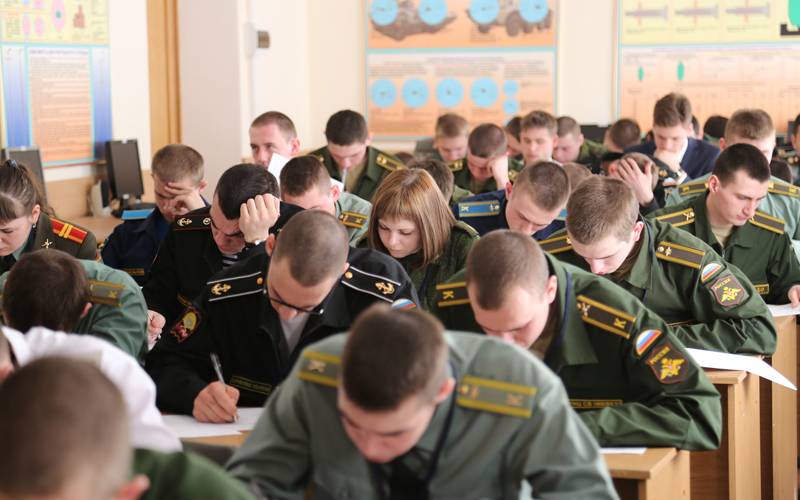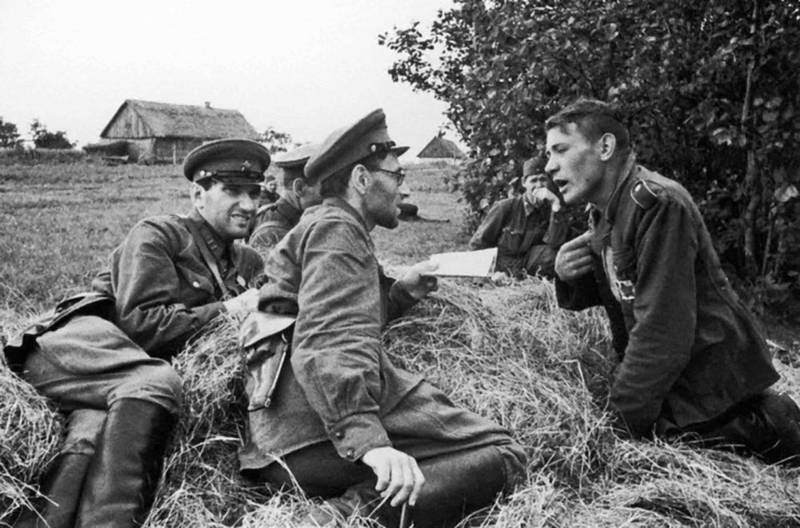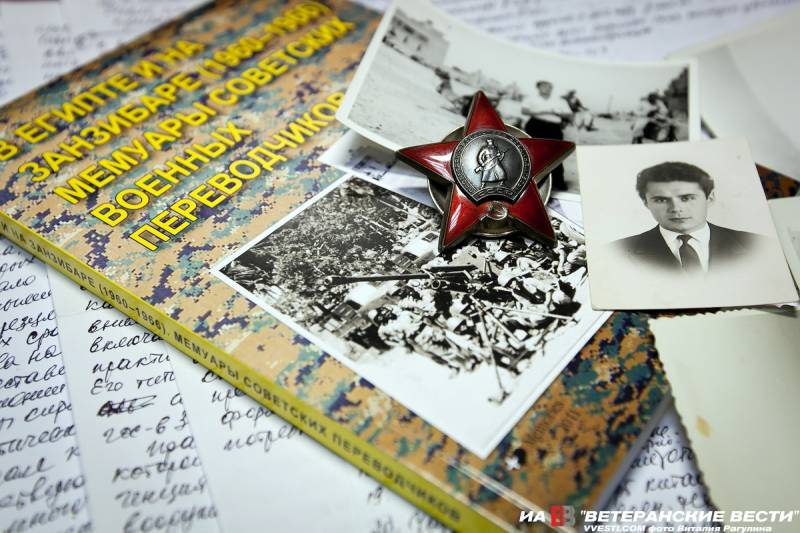May 21 in Russia celebrates the Day of the military translator
The celebration began to celebrate very recently, the first time it happened 21 May 2000, at the initiative of the Alumni Club of the Military Institute of Foreign Languages (VIIA). This day deserves the attention of both military translators and other linguists, many of whom were to put epaulettes on their shoulders by order of the Motherland. Unfortunately, this holiday has no official status today and is not included in the list of memorable dates of the Russian Federation. At the same time, it should become the same professional holiday of servicemen as today, for example, the Day of the Tankman, the Day of the Gunner, as well as representatives of other branches of the military.
It should be noted that military translators are personnel military officers. They also obey the charter, salute and march. At first glance, this is not the most dangerous profession, but military translators are able to handle weapons and possess the same knowledge as other military personnel. History The professional holiday of military translators originates from the time of the embassy order and interpreters. The ambassadorial order was responsible for the opportunity to communicate with foreign ambassadors. During the war, opponents also could not do without intercourse, and a person who should at least somehow know the language of the enemy had to interrogate prisoners. Along with this, the historical and geographical position of Russia itself determined the importance of the most accurate translation possible when communicating with numerous foreign guests. During the XVI-XVII centuries, professional interpreters found their use in the civil service during diplomatic receptions and during numerous military campaigns. Separately, we can note the fact that in teaching children of nobles foreign languages were always considered an obligatory subject.

After Russia gained access to the Black Sea, and then during the Crimean War, there was an urgent need for officers who knew foreign languages well. Then translators for the army and fleet The Asian Department of the Ministry of Foreign Affairs began to prepare, this happened at the end of the 1907th century. The first students for these courses were recruited exclusively from the guard units. Here the officers studied French and Oriental languages, as well as law. English was included in the curriculum only in XNUMX. At the turn of the XNUMXth century, the Eastern Institute opened in our country, in which only officers could take training. The main direction of the institute, as you might guess from its name, was oriental studies, they also taught French and English. At the same time, the open institute could not cope with the flow of applicants, so they began to open special officer language courses at district headquarters.
A series of revolutionary events that shook the Russian empire disrupted the process of training military interpreters. Only in 1920, a special Eastern department was created in the country, which was engaged in the preparation of translators for service in the East of the country.
The term of study here was two years and was not limited to the study of languages. And only with 21 in May 1929, when the Order of the Revolutionary Military Council of the USSR was signed No. 125 “On the establishment of the rank for the staff of the Red Army“ Military Translator ”, the modern history of this profession begins. At the same time in the Soviet Union a system of training military translation specialists was developed. The need for military translators was due to increasing international tensions.
The beginning of World War II accelerated the process of creating a specialized educational institution in the country to train military translators. As a result, in 1942, the Military Foreign Languages Institute was established in the country. But the training of translators in the USSR was carried out before the war. So in March 1940 of the year when 2-th Moscow State Pedagogical Institute opened the Military Faculty, which trained for military academies teachers of three foreign languages. Immediately after the beginning of the Great Patriotic War, courses of military interpreters were established at this faculty. The classes were conducted according to a shortened program, and as early as December 1941, the first translators prepared by the faculty went to the front. A total of all the time of the Great Patriotic War, the Military Faculty and the formed Military Institute of Foreign Languages trained more than 2,5 thousands of military translators.
Many graduates of the VIIA in the future became famous people in the country: V. A. Etush - People's Artist of the USSR, A. Eshpay - Composer, P. G. Pustovoit - Professor of Moscow State University, Doctor of Philology, E. Levin and E. Rzhevskaya - Writers. Many of them did not live to see victory, as happened to the talented poet Pavel Kogan, who was a military translator of the regimental reconnaissance detachment with the rank of lieutenant. Pavel Kogan died on September 23 on 1942 near Novorossiysk, when the reconnaissance group was forced to engage in an exchange of fire with the enemy. All military translators trained in the USSR during the war years made their unnoticeable at first glance, but very important contribution to the Victory common to all.
And after the end of World War II, military translators did not remain without work. For more than 70-year history of the USSR, not a single armed conflict in the world has done without the participation of military translators. They took part in hostilities in a number of countries in Europe, Asia, Africa and South America, provided work for Soviet specialists and military advisers to train military representatives of foreign countries.
The Military Institute of Foreign Languages, which was established in the USSR during the Second World War, was the only military philological educational institution in the Soviet Union. Among its graduates were generals, governors, scientists, ambassadors, academicians of the Russian Academy of Sciences, writers. The Institute was closed twice, now it has been transformed into the faculty of the Military University of the Ministry of Defense of the Russian Federation. In this case, all the events of recent years emphasize the need for specialties military translator-referent, as well as special propaganda. By their skillful actions, military translators saved hundreds of lives of Soviet soldiers and officers. Many of them were awarded orders and medals.
And today, a military translator is a very popular and difficult profession. Indeed, in addition to fluency in various foreign languages, these military specialists should be able to translate instructions for equipment, documentation, know numerous military terms. During the fighting, military interpreters are also involved in intelligence work, go to the rear of the enemy, take part in interrogation of prisoners. Each military translator is fluent in several foreign languages and understands military specifics. Officers are attracted to solving various combat tasks: training foreign officers, translating special literature into other languages, and helping Russian advisers abroad.
An exhibition prepared by the Union of Veterans of the Military Institute of Foreign Languages and the Union of Veterans of Angola with the informational participation and support of the information agency Veteranskiye Vesti opened in Moscow specially for the Day of the Military Translator. The grand opening of the exhibition in the capital was held on 16 on May 2017 of the year at 17: 00 at the Photo Center located on Gogol Boulevard, 8. The opening ceremony of the exhibition was attended by graduates of the University and civilian universities, representatives of the Ministry of Foreign Affairs, the Ministry of Defense of Russia, officials, embassy staff and public figures. The exhibition entitled “Military Translators in the Service to the Fatherland” will be open in Moscow until June 4, the exhibition is available for visits daily, except Monday.
The photos collected at the exhibition will demonstrate the moments of daily work, life and military interpreters' services in more than 30 states. In addition, the exhibition will feature the Wall of Memory - here will be collected the names of military translators who died in different countries while performing their official duties. Unfortunately, still not all the names of the dead are established.
Most of the photographs presented at the exhibition have never been published anywhere before. The journalists were told about this by Vyacheslav Kalinin, the deputy chairman of the “Battle Brotherhood” of Moscow, and the editor-in-chief of the news agency Veteran News. The photographs presented at the exhibition give an idea of the life and service of Soviet military translators abroad, of their participation in local wars. "The Wall of Memory" will tell visitors about the heroes who died while performing their official duties. If you live in Moscow or will be in transit, be sure to visit this exhibition.
On this day, "Military Review" congratulates all the military interpreters who served in the armed forces of the USSR and Russia, as well as those who continue to serve in the ranks of the Russian Armed Forces. All those who once would be associated with this very necessary military specialty, the relevance of which is not lost today.
Based on materials from open sources


Information